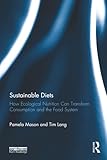Sustainable diets : how ecological nutrition can transform consumption and the food system / Pamela Mason and Tim Lang.
Publisher: London : Routledge, 2017Description: xiv, 353 pages : illustrations, mapContent type: text | still image | cartographic image Media type: unmediated Carrier type: volumeISBN: 9780415744706; 9780415744720Subject(s): Food supply -- Environmental aspects| Item type | Current library | Class number | Copy number | Status | Date due | Barcode | |
|---|---|---|---|---|---|---|---|
| Book | House of Lords Library - Palace Dewey | 338.19 MAS (Browse shelf(Opens below)) | 1 | Available | 014666 |
"Earthscan from Routledge."
Introduction: what's the problem?; Introduction; Outline of the book; References; Chapter 1: Sustainable diets: welcome to the arguments; Core arguments; Sustainable diets: both a practical and conceptual problem?; Sustainable diet as code for better consumption; The intellectual case for sustainable diets; Reactions to the case for sustainable diets; The framework used in this book: six key headings; References. Chapter 2: Methodologies: measuring what matters while not drowning in complexityCore arguments; What is the point of indicators and measurement?; Available indicators and measures of a sustainable diet; Health indicators; Environmental indicators in relation to diet; Social values; Economic indicators; Food security indicators; Social LCA; Multi-criteria indicators; Conclusions; References; Chapter 3: Health: nutrition science and the messy effects of diet on health; Core arguments; Dietary links with health; Causes of obesity; Non-communicable diseases (NCDs); Under-nutrition. Dietary guidelinesMicrobiological foodborne illness; Chemical foodborne illness; Antibiotic use in the food system; Health effects for people associated with food production; Is a healthy diet an environmentally friendly diet and vice versa?; Conclusions; References; Chapter 4: Environment: why food drives ecosystem stress; Core concepts; The impact of food and diet on the environment; Climate change; Energy use; Water; Land use; Soil; Biodiversity; Local food; Organic food; Waste; Environmental impacts of diets; Conclusions; References. Chapter 5: Culture and society: the social conditions shaping eating patternsCore arguments; Food is social; Food access and inequality; Causes of dietary inequalities; Hunger amid affluence; Human right to food: could sustainable diets fit in?; Cultural appropriateness; Pleasure: the subversive element of sustainable diets; Identity; Marketing; Labelling, education and information; Animal welfare; Fair trade; Conclusions; References; Chapter 6: Food quality: everyone likes their own food; Core arguments; What is food quality?; The visibility of food quality: making the(un)sustainable obvious. Bridging personal and cultural preferencesReferences; Chapter 7: Real food economics: runaway costs and concentration; Core arguments; Why economics matters for the sustainable diets debate; Economics of the food system: price or priceless?; The real cost of food; Conclusions: fixing the economics for sustainable diets; References; Chapter 8: Policy and governance: will anyone unlock the consumption lock-in?; Core arguments; What is meant by policy and governance?; Different positions emerge on what to do; Governance in practice: who has tried to do what?; Governance themes have emerged. Conclusion: achieving action through the SDG2 strategy.
